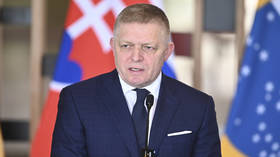New movie Mr. Jones, about reporter who exposed Ukraine famine horrors, is a timely reminder of the cowardice of our current press

In 1933, British journalist Gareth Jones risked life and limb in service to the truth, while in comparison, the journalists of today only care about access to power and towing the elites’ ideological line.
Mr. Jones, a new film by esteemed director Agnieszka Holland, tells the true story of Gareth Jones, a Welsh journalist who travels to the Soviet Union in 1933 and uncovers the Holodomor, Stalin’s genocidal famine of Ukrainians.
Sadly, Mr. Jones, which boasts a fantastic cast of James Norton, Vanessa Kirby and Peter Sarsgaard, is a terrific story wrapped in a bad, dramatically unfocused and meandering film.
But thankfully, despite its cinematic unworthiness, the movie still contains important insights very relevant to our current time.
What makes Mr. Jones noteworthy is that the film’s noble protagonist is, unlike our current corrupt press corps, a dogged journalist more loyal to truth than to ideology, and more interested in maintaining his integrity than gaining access to power and wealth.
The film opens with Jones fresh off his 1933 interview with Hitler that leaves him convinced that war is ultimately inevitable. This belief gets him ridiculed for being naïve and hysterical by the stodgy and comfortable old guard of the British press.
Jones then sets his sights on the Soviet Union and tries to figure out how Stalin has been able to pull off his economic boom while the rest of the world is mired in depression, so he goes to Moscow in search of answers.
Upon arrival, he finds not the worker’s paradise that fellow journalists, like the New York Times’ Pulitzer Prize winning reporter in Moscow, Walter Duranty, have been deceptively portraying to the world, but instead discovers firsthand the repressive and totalitarian nature of Stalin’s Soviet Union.
Jones then follows a lead and risks his life by sneaking off a train and going to Ukraine, where he is thrust into the horrors of the Holodomor, which are brutally and effectively depicted in the film.
When Jones exposes this calamity to the Western world, political expediency causes it to be met with either skepticism or indifference. Unlike other journalists of his, or our, age, Jones refuses to tell people in power what they want to hear, instead telling them the truth, and is essentially blackballed and exiled because of it.
No doubt the same would happen today to any reporter brave enough to go against the officially approved narrative.
Our current press corps is inhabited by truth-disdaining, sycophantic stenographers more akin to the villainous Walter Duranty, a propagandist for the cause who sold his journalistic soul in exchange for a decadent and depraved lifestyle, than the truth-seeking Gareth Jones.
It is ironic that journalists of yesteryear, like Duranty, were complicit in positive falsehoods about Stalin’s Soviet Union, while journalists of today are complicit in negative falsehoods about Russia.
The cavalcade of journalistic failures and fiascos directly or tangentially related to Russia in recent years include, but are not limited to, the distortion of truth about the Maidan uprising, the supposed Syrian chemical weapons attacks, the ridiculous Cuba microwave weapons story, and of course, Russiagate, the biggest journalistic fraud perpetrated upon the American public since the Iraq War. And just this week we have added to this cornucopia of corporate media crap the ‘Russians pay bounty to kill American soldiers in Afghanistan’ nonsense. All of these stories are vapid, thin, propagandistic gruel, devoid of any depth, insight or actual reporting.
One glimpse at the ever-growing list of recurring journalistic farces involving Russia and it becomes glaringly obvious that Operation Mockingbird, the Cold War CIA program that planted stories and journalists in newsrooms across the media, is alive and well in practice, if not in name.
It is readily apparent that just as Walter Duranty was getting his marching orders from the Kremlin, reporters of today get their marching orders from Langley.
Of course, the truth-averse, ideologically driven journalism of the corporate media isn’t restricted to just Russia stories, as evidenced by the slavish and slanted coverage of Black Lives Matter and other woke endeavors.
The thing that I find most grating about the reliably deceptive establishment media is their incessant complaining about Trump’s alleged war on the press.
These same news outlets were conspicuously silent when Obama prosecuted whistleblowers nine times, which is three times more than all of his predecessors combined.
There was also nary a word of dissention from the intrepid souls in the media when Obama’s Department of Justice and FBI spied on reporters and tried to coerce them to expose their sources.
The most glaring example of the ideological cancer in journalism is the cheering by the establishment media of the prosecution and persecution of Julian Assange, who has done more to inform the public of the truth than any corporate-controlled reporter at any news outlet in the world, and may very well die in prison for it.
The current crop of subservient sycophants play-acting as journalists in the corporate media are an utter disgrace to their profession, and they dishonor the staggering sacrifice that people like Gareth Jones made in service to truth.
Mr. Jones is not a great movie, but it does chronicle the great struggles of a noble man. If only we had many, many more like him today, maybe truth would be revered and the powerful held accountable.
The statements, views and opinions expressed in this column are solely those of the author and do not necessarily represent those of RT.

















